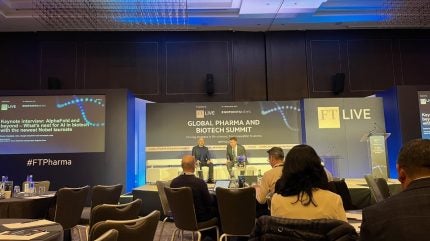
The role of artificial intelligence’s (AI) in healthcare took a leap forward in 2024 when the Nobel Prize in Chemistry was awarded to scientists including Demis Hassabis for their work on AlphaFold, a programme heralded as a solution to the “50-year-old problem of protein structure prediction”.
At the Financial Times (FT) Pharma and Biotech Summit in London on 6 November, Hassabis, CEO and co-founder of Google DeepMind and Isomorphic Labs, shared his insights on the role of AI in healthcare and its future potential. Hassabis believes that AI could have an even greater impact on society than the internet or mobile technology, comparing it to an “electricity or fire kind of impact”.
Building on his success with AlphaFold, Hassabis founded Isomorphic in 2021, a digital biology company that uses AI for drug discovery. Isomorphic’s strategy focuses on algorithmic innovation rather than building wet labs, as Hassabis believes there is “still a lot of juice to be squeezed” from existing data sources through advanced techniques like synthetic data generation.
According to a GlobalData survey, AI is considered the most disruptive technology among businesses, including in the healthcare industry. Hassabis emphasised AI’s value in this field: “I can’t think of a better use case than using AI to try and find cures, to help celebrate finding cures to terrible diseases. What would be a better, more beneficial use of AI?” he asked.
GlobalData is the parent company of Pharmaceutical Technology.
In 2024, Isomorphic secured high-profile collaborations with pharma giants Eli Lilly and Novartis, totalling $1.7bn and $1.2bn respectively. Though Hassabis kept specific project details under wraps, he said that “they are going extremely well”.
Access the most comprehensive Company Profiles on the market, powered by GlobalData. Save hours of research. Gain competitive edge.

Your download email will arrive shortly
We are confident about the unique quality of our Company Profiles. However, we want you to make the most beneficial decision for your business, so we offer a free sample that you can download by submitting the below form
By GlobalData
However, Hassabis also acknowledged the potential existential risks posed by advanced AI systems and underscored the need for research, evaluation, and regulatory frameworks to address them. “I think it needs to be taken very seriously and treated a lot more humility and respect that I think this kind of technology deserves,” he said.
He urged collaboration among governments, civil society, and academia to develop testing protocols and guardrails, saying: “There are so many unknowns about it, and I think we need a lot more research on that, and we’re trying to do that.”
When describing his overall stance on AI, Hassabis described himself as “a cautious optimist.” He explained: “I’m optimistic that we’ll get this right, as long as we approach it in the right way, actually, using the scientific method and trying to be very thoughtful about each step that we take as a vehicle.”
Looking forward to the future, Hassabis shared his ambitious vision: “My dream is to eventually have virtual cells, like a simulation of a virtual cell. We’re maybe ten years away from that,” he concluded.

